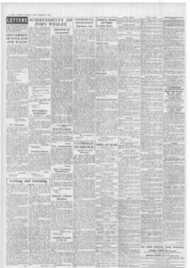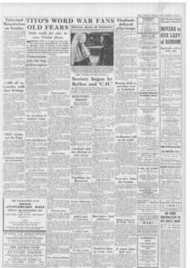Page 2, 4th September 1953
Page 2

Report an error
Noticed an error on this page?If you've noticed an error in this article please click here to report it.
Tags
Share
Related articles
Boswell And John Wesley
Doctrine Of
The 'living Room'
Dim Religious Background
Hints On The Lector's Task
ACHIEVEMENTS OF JOHN WESLEY
SIR,-Speech and writing are going to come to a stop if one is to
think of everyone who may be adversely affected by one's re marks, even those made in justice and charity. "Torquemada" is worried about "lapsed Catholics who
have accepted the idea that one re
ligion is as good as another." He seems entirely unmoved by the fact
that one of our separated brethren (for once in a way) has been edified and not scandalised (see the letter page in THE CATHOLIC HERALD two weeks ago).
But "Torquemada" will have to choose: John Wesley's work can
hardly be overestimated; it is a ques
tion, for instance, of a Cornwall semipagan. licentious, abysmally ignorant, or a Cornwall steady, honest, living a genuine social corporate life and worshipping the God and Father of our Lord Jesus Christ.
That Wesley and his followers were strongly anti-Catholic should not sur
prise or shock any of us. What does "Torquemada" expect. given the historical conditions of the time? That his followers still are is even less sur prising considering our attitude towards them. I suggest that "Tor quemada" tries the experiment of making friends with some of the followers of this "near saint" or "pos sible hcresiarch,' and learn for himself how ignorant of and prejudiced against Catholicism they arc, because of the Wesley tradition, and because they have met no Catholics.
Quoting from the works of poets as if from papal encyclicals is not
argument; besides, other people know poems too: the third verse of Hilaire B.elloc's poem runs, of course :
On childing women that are forlorn, And men that sweat in nothing but scorn:
That is on all that ever were horn,
Miserere Domine.
(Italics mine.) May I suggest as a literary and moral exercise a study of the same poet's work on "Courtesy"?
Rachel Attwater.
3 Trenwith Lane, St. Ives, Cornwall.
blog comments powered by Disqus







